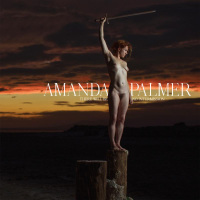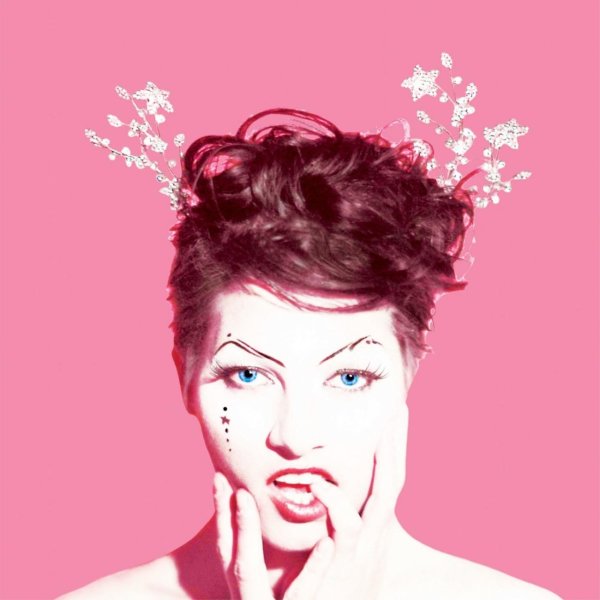 BY SOPHIE BURKHOLDER After a six year break from her solo work, singer-songwriter Amanda Palmer is back with a new album called There Will Be No Intermission. Her most personal work to date, she openly sings of her experiences with abortion, miscarriage, and the death of close friends. Now on tour in support of the new record, she plans to re-emphasize an emotional connection with her fans in three-hour-long shows that will arrive in Philadelphia at the Temple Performing Arts Center on Saturday April 6TH. We got her on the phone in advance to talk about the themes of death and loss in the new album, and how getting older has made her care more about the emotional capacity of her work, and less about what critics have to say about it.
BY SOPHIE BURKHOLDER After a six year break from her solo work, singer-songwriter Amanda Palmer is back with a new album called There Will Be No Intermission. Her most personal work to date, she openly sings of her experiences with abortion, miscarriage, and the death of close friends. Now on tour in support of the new record, she plans to re-emphasize an emotional connection with her fans in three-hour-long shows that will arrive in Philadelphia at the Temple Performing Arts Center on Saturday April 6TH. We got her on the phone in advance to talk about the themes of death and loss in the new album, and how getting older has made her care more about the emotional capacity of her work, and less about what critics have to say about it.
PHAWKER: Why did you decide to take a six year gap in your work? Did you know you were going to take this much time off in putting out your own music?
AMANDA PALMER: That’s actually a little bit of a complicated answer, because I never  really stopped putting out music, per se. Between Theatre Is Evil and this record, I’ve put out two full LP side projects, a bunch of singles, a bunch of videos. I don’t think three months have really gone by without me releasing something. But it’s a good question. I really wanted to be done with the stranglehold of album cycles for a while, but this record seemed like a really obvious collection. And I kind of let the material take the driver’s seat. At a certain point, I just had to admit that even if I didn’t want to make an entire record, it really, it’s still the way the world works. I also knew that I was never going to be able to command the attention of the media if I continued to put songs out every six weeks. It’s simply not the way the world works. And even though the Internet has vaulted us into the future technologically, the media still operates in cycles that haven’t changed since the 70’s. And that’s fine. I think things have remained that way for a reason. Then there’s also the really interesting artistic chicken-and-egg thing that happened. Now that I’ve put together this collection, it has suggested entirely new forms of artwork that have erupted around it – like the book and the tour – and this set of stories that go along with the album that I’m going to be hand-delivering to tens of thousands of people around the country. That may not have happened if I hadn’t gone back into the death-grip of the album cycle [laughing]. So I don’t mind. It gave me a reason to have some parameters and to work within them.
really stopped putting out music, per se. Between Theatre Is Evil and this record, I’ve put out two full LP side projects, a bunch of singles, a bunch of videos. I don’t think three months have really gone by without me releasing something. But it’s a good question. I really wanted to be done with the stranglehold of album cycles for a while, but this record seemed like a really obvious collection. And I kind of let the material take the driver’s seat. At a certain point, I just had to admit that even if I didn’t want to make an entire record, it really, it’s still the way the world works. I also knew that I was never going to be able to command the attention of the media if I continued to put songs out every six weeks. It’s simply not the way the world works. And even though the Internet has vaulted us into the future technologically, the media still operates in cycles that haven’t changed since the 70’s. And that’s fine. I think things have remained that way for a reason. Then there’s also the really interesting artistic chicken-and-egg thing that happened. Now that I’ve put together this collection, it has suggested entirely new forms of artwork that have erupted around it – like the book and the tour – and this set of stories that go along with the album that I’m going to be hand-delivering to tens of thousands of people around the country. That may not have happened if I hadn’t gone back into the death-grip of the album cycle [laughing]. So I don’t mind. It gave me a reason to have some parameters and to work within them.
PHAWKER: Are these songs on There Will Be No Intermission from pretty recent memory, or have they slowly accumulated over the past six years since Theatre Is Evil?
AMANDA PALMER: The oldest song on the record is probably from around 2012, and I haven’t done the post-mortem diagnostics on the chronology of the record, but my guess is that I produced about one of these songs per year. A pile of them were written in the last year, like “Voicemail for Jill” and “The Ride” and “Death Thing” all tumbled out once I had the basic shape for the record and sort of saw what was missing.
PHAWKER: You’ve always revealed so much of yourself and your personal thoughts in your music, but There Will Be No Intermission still feels more intense to me than some of your previous work. I’ve seen the articles from 2012 and 2013 that essentially rip you to shreds over things like your poem related to the Boston Marathon bombing or your requests for musicians to tour with you for free. The criticism can get pretty brutal, so why did you decide to not only continue being open with your personality, but then let people in even more? I heard you talk about this idea of having a “circle of  grief” in reference to traumatic events like the miscarriage and abortion you went through. Why did you choose to make the public a part of that circle?
grief” in reference to traumatic events like the miscarriage and abortion you went through. Why did you choose to make the public a part of that circle?
AMANDA PALMER: Well, I don’t really know how to define the public anymore. I have 15,000 patrons, and they don’t feel like the public, but they are. I also have a million Twitter followers – are they the public? Is anyone who can comment on my Facebook posts the public? Is anyone who isn’t me the public? I don’t know anymore, and I don’t really care. What I do know is that the more I reach into myself, and the more I reveal myself in my artwork, the more connected I feel to whoever the audience is when they show up. And it’s made me braver and I think better at being a more vulnerable writer and performer. My main weapon is my vulnerability. It’s really hard for someone to tear you down when you’re already baring your throat. I find making this kind of artwork and watching the resonance it has with other human beings deeply therapeutic. So to me, the alternative is way worse. The idea that I would back off into a corner and become more private and more enigmatic and more secretive and hide away from critics and detractors – to me, that would be kind of a personal hell. I’m much more interested in learning how to connect with those people, and how to, I don’t really want to say conquer them, because I’m not trying to do that. But I’m much more interested in trying to learn how to converse with people than in learning how to run away from them. I’ve just never run away from conflict. I think that’s cowardly. I also don’t think any of the pleasures of life reside in running away. My life and my artwork and the connections that I’ve made with all of these people has sort of become one giant, inseparable pile, and I think it should be that way. As human beings, we’re pretty terrible in the way that we compartmentalize our lives.
PHAWKER: I know you just played at SXSW last week, which is a festival known for artists playing several shows in a short period of time. With such deep-cutting emotion on songs from There Will Be No Intermission, I wanted to know how it feels to perform those songs openly so often. Does it ever feel repetitive and monotonous, and thus draining? Are there times when you plan to perform one song, but can’t when the moment arrives? Do you ever have to separate yourself from the meaning of them to be able to go onstage every night?
AMANDA PALMER: I mean, you can check back with me in two years and ask the same question, and you might get a different answer. There are songs that I’ve written back in 2012 or 2013 that I’ve played live now nearly a hundred times, and I’ve never found them boring or repetitive. These songs resonate in very real ways through real human beings. So in that sense, it’s sort of like asking a hospice worker if they get bored holding people’s hands while they die. So is it repetitive? Sometimes yes, but is it boring? No it’s never boring. Never. It always feels like the song is just a vessel or a passage to something much more important going on.
PHAWKER: Yeah, well I didn’t necessarily mean boring, but whether or not playing them so much can be draining on you because of how personal they are.
AMANDA PALMER: Well, yeah, that too. It’s definitely really exhausting to play this material, because being emotional is tiring [laughing]. But, that’s my fucking job! I picked this job and I like this job. It was also emotionally exhausting being a stripper. It’s emotionally exhausting being married. It’s emotionally exhausting being a mother. But I find infinite enjoyment in all of those activities. I picked this, and I don’t ever resent it. I do have to take care of myself though. This first leg of tour is really light. I’m only doing a show 2-3 times a week for a reason, and it’s a three hour show. The idea of doing this eight times a week might drive me a little bit crazy.
PHAWKER: I read a brief profile of you in The Guardian that quoted you as saying “What I do comes from a deep desire to be seen and to see others.” That quote was presented as a negative quality to have, and I wanted to know, especially from your perspective as a woman, why saying something like that might make people uncomfortable? I also heard you say in a recent interview that today there is “something very dangerous about being a loud woman.”
AMANDA PALMER: Hm, that’s always been true. I mean you probably kind of know the answer to that already. It’s really exhausting standing up and stating your emotional opinions as a woman, especially when you’re an artist and a feminist, because you get it from all sides. The right wing yells at you, the left wing yells at you, the conservatives yell at your, the liberals yell at you. The conservatives yell at you simply for just being a woman with an opinion, and your lefty liberal feminist friends can yell at you for not getting the tone quite right, or not using the right words. It’s exhausting work, but we’re doing it for a reason [laughing]. I get more and more excited by this work the less afraid I become. I was so much more afraid of everybody and everything and all of these opinions in my 20s. Then things got shifted away from that more in my 30s. And now that I’m in my 40s, I care a great deal more about my progress and give a great many fewer fucks about people’s opinions on me and my work. It’s especially vindicating because I have an army of 15,000 people who’ve backed me, who literally have my back, who have put down their credit cards and said that they will fund my artwork and that they care about what I have to say. At a certain point, that speaks for itself, and I don’t need to be a media darling or the celebrated feminist du jour. I just keep my head down and keep working, and that in itself is its own reward.
PHAWKER: When do you think that transition occurred from kind of being afraid of being perceived in the right way to not caring as much?
AMANDA PALMER: I am still in transition, and I will probably be in transition until the day I die [laughing]. Being patron-funded has sped that transition along greatly. I now have a lot more time and energy to focus on my work, instead of focusing on the hustle to get people to support my work.
PHAWKER: You’ve said that your music is an attempt to “put out the direct truth of my experience while still being allowed to call it art.” To me, that implies that there are some rules to what can and can’t be art, or at least in terms of music. What are those rules for you?
AMANDA PALMER: There are none. That’s such a short answer [laughing]. There’s a reason that I’m a musician and not a music critic. The older I get, the less interested I am in figuring out how to classify and define my own work, especially as I see that those classifications aren’t necessarily helpful, and that the work itself is what works. I said to my publicist last night that I’m working in an entirely different metric. There’s the metric of sales and streams and chart positions. And then there’s the metric of souls touched and people crying and the number of women who’ve held me in their arms in the last few weeks to tell me their abortion stories. And I’m way more interested in the latter metric. I just couldn’t give a shit about the former one. Not that one doesn’t reflect the other, but the former metric is not my concern at the moment.
AMANDA PALMER @ TEMPLE UNIVERSITY PERFORMING ARTS CENTER SAT. APRIL 6TH

